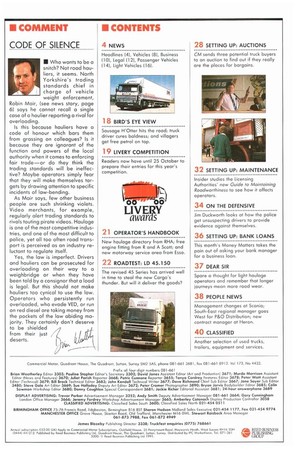CODE OF SILENCE
Page 3

If you've noticed an error in this article please click here to report it so we can fix it.
• Who wants to be a snitch? Not road hauliers, it seems. North Yorkshire's trading standards chief in charge of vehicle weight enforcement, Robin Moir, (see news story, page 6) says he cannot recall a single case of a haulier reporting a rival for overloading.
Is this because hauliers have a code of honour which bars them from grassing on colleagues? Is it because they are ignorant of the function and powers of the local authority when it comes to enforcing fair trade—or do they think the trading standards will be ineffective? Maybe operators simply fear that they will make themselves targets by drawing attention to specific incidents of law-bending.
As Moir says, few other business people are such shrinking violets. Video merchants, for example, regularly alert trading standards to rivals touting pirate videos. Haulage is one of the most competitive industries, and one of the most difficult to police, yet all too often road transport is perceived as an industry reluctant to regulate itself.
Yes, the law is imperfect. Drivers and hauliers can be prosecuted for overloading on their way to a weighbridge or when they have been told by a consignor that a load is legal. But this should not make hauliers too cynical to use the law. Operators who persistently run overloaded, who evade VED, or run on red diesel are taking money from the pockets of the law abiding majority. They certainly don't deserve to be shielded from their just deserts.












































































